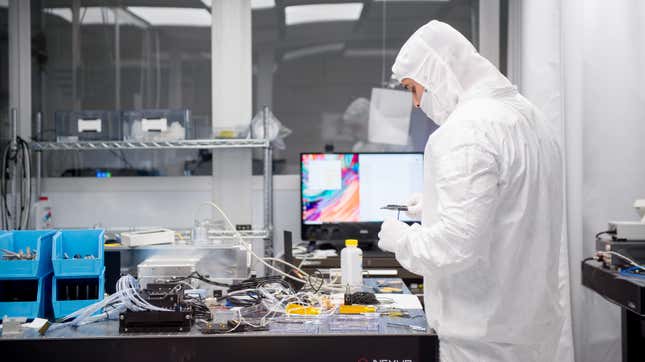
At its AWS re:Invent 2019 conference on Monday, Amazon announced the launch of a quantum cloud computing platform.
Now that quantum computers are real and can perform computations (albeit not well), companies are introducing platforms upon which scientists and others interested in the technology can experiment. Amazon’s system, named Braket, will provide access to three well-known quantum devices from IonQ, Rigetti, and D-Wave. This is, as far as I know, Amazon’s first official step into the quantum world.
“We believe that opening up access to current-stage quantum computers is a crucial step in accelerating the development of useful applications. That’s why, in designing Amazon Braket, we chose to collaborate with providers like D-Wave, who have built promising technologies that are of interest to our customers,” Simone Severini, director or quantum computing at Amazon Web Services, said in a statement sent to Gizmodo. “Together, we can make it easier for researchers to innovate, with the shared goal of realizing the true long-term potential of quantum computing.”
Quantum computers are devices that run algorithms using a different kind of mathematics than a regular computer—one based on the probability-driven laws that govern how subatomic particles interact. First devised by Richard Feynman in the early 1980s, well-known companies like Google, IBM, and Microsoft, as well as startups like IonQ and Rigetti, have realized these machines.
Today’s quantum computers have more potential than actual function—they’re difficult-to-control, noisy devices that can quickly lose the quantum behavior that makes them special to tiny jostles from the surrounding environment. They won’t beat a computer at everything, just a subset of problems that may one day include modeling the behavior of molecules, factoring large numbers, and maybe the kinds of optimization problems commonly seen by businesses. Companies in the financial, energy, and pharmaceutical sectors have all shown interest in quantum computing, while governments are interested in its potential applications for cybersecurity and nuclear weapons.
But once you have a machine, you need to be able to program it. Braket will allow researchers to “build, test, and run quantum computing algorithms” on both quantum devices and simulations of quantum devices, according to an Amazon press release. It includes tutorials and a learning environment, a space to run built-in algorithms and test new ones, and allows users to automate the running of quantum programs. The name, Braket, surely comes from the “bra-ket” notation that physicists use to represent quantum information.
Braket will allow users to program one of the three available quantum machines, each of which is a bit different from the other. IonQ’s ion trap quantum computer represents each unit of quantum information as an individual atom trapped by lasers, and their devices are some of the least-noisy ones available. The startup Rigetti’s superconducting computer instead represents each qubit as an artificial atom made from superconducting wire. D-Wave’s quantum annealer, also made from superconductors, operates on a different principle that can only run a subset of the problems that other quantum computers can, and they’re mostly related to optimization.
Other companies already have services where you can program their quantum computer on the cloud: IBM’s Qiskit offers access to their various superconducting machines, and Google will soon connect its own quantum computers to its Cirq platform. Microsoft, too, offers access to the IonQ computer through its Azure platform while it tries to construct its own quantum computer.
Amazon’s announcement differs in that, as far as we know, this is its first entrance into the quantum world. Wired reports that Amazon will also be opening a quantum research center with CalTech, and it may one day construct a quantum computer of its own.
As a reminder: Quantum computers do not do anything useful, yet, unless you think that generating “certifiable random numbers” is useful. A quantum “killer app” could be a few years—or even a few decades—away as researchers are trying to figure out what algorithms will be faster on the near-term, noisy, “NISQ-era” quantum computers than on a supercomputer.
Companies aren’t accessing these devices through cloud services because they hope to crack your encryption or do something nefarious (yet). Instead, perhaps offering more ways for researchers to access quantum computers will produce more ideas for potential applications that could come around sooner.